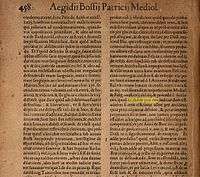In dubio pro reo
The principle of in dubio pro reo (Latin for "[when] in doubt, for the accused")[1][2] means that a defendant may not be convicted by the court when doubts about his or her guilt remain.

The rule of lenity is the doctrine that ambiguity should be resolved in favor of the more lenient punishment.[3]
To resolve all doubts in favor of the accused is in consonance with the principle of presumption of innocence.[3]
Origin
The main principle in the sentence was part of Aristotle's interpretation of the law and shaped the Roman law: Favorabiliores rei potius quam actores habentur (Digest of Justinian I, D.50.17.125);[4] in English: "The condition of the defendant is to be favored rather than that of the plaintiff."[5] However, it was not spelled out word for word until the Milanese jurist Egidio Bossi (1487–1546) related it in his treatises.
National peculiarities
In German law, the principle is not normalized, but is derived from Article 103(2) GG, Article 6 ECHR, as well as § 261 Code of Criminal Procedure. The principle has constitutional status. The common use of the phrase in the German legal tradition was documented in 1631 by Friedrich Spee von Langenfeld.
In Canadian law, the leading case establishing how to decide criminal cases where the guilt of the accused depends on contradictory witness accounts is R. v. W.(D.) (1991).
References
- Beard, Henry (2004-08-19). Latin for All Occasions: From Cocktail-Party Banter to Climbing the Corporate Ladder to Online Dating-- Everything You'll Ever Need to Say in Perfect Latin. Avery. ISBN 978-1592400805.
- Henry Beard (2008-06-01). "Famous Latin Proverbs and Sayings". Latin for All Occasions. Archived from the original on 2013-07-18.
- Corona, J. "G.R. No. 173473 – PEOPLE OF THE PHILIPPINES versus BETH TEMPORADA". Republic of the Philippines: SUPREME COURT Manila. Retrieved 2018-10-21.
- "OMINI NOSTRI SACRATISSIMI PRINCIPIS IUSTINIANI IURIS ENUCLEATI EX OMNI VETERE IURE COLLECTI DIGESTORUM SEU PANDECTARUM" (in Latin). The Latin Library. Retrieved 2018-10-21.
- "defendant". Academic: Law dictionary. 2017. Retrieved 2018-10-21.
External links
- Larouer, Christophe J. (April 2009). "In the Name of Sovereignty? The Battle over In Dubio Mitius Inside and Outside the Courts". Cornell Law School Inter-University Graduate Student Conference Papers. Retrieved 2018-10-21.